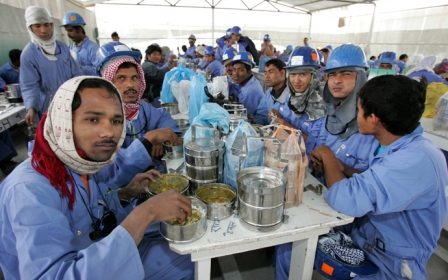Qatari farmers fear their Saudi-based workers will 'starve to death'

Qatari business owners who own farms inside Saudi Arabia say their workers have been left stranded inside the oil-rich kingdom, due to the ongoing diplomatic crisis inside the Gulf, according to Human Rights Watch.
The rights group claim that the Saudi-led siege against Qatar has led to a series of rights abuses against migrants working in the building and farming industry.
The Qatari farmers have voiced their fears to HRW that its workers which are registered inside Qatar, would be left to starve as they are unable to directly send money to them.
The concerns for migrant workers trapped inside Saudi Arabia were further compounded after the local authorities launched a nationwide campaign last month, aimed at locating and expelling foreigners who have overstayed their visas.
Omar, a Qatari national who owns a farm inside Saudi Arabia, told the rights group that he was unable to send money directly to them and feared his Bangladeshi workers were being left to starve.
"I can send their salaries to Bangladesh, but how can I feed them? The supermarket (in Saudi Arabia) refused to give them anything (because they have no money), and we are scared the police will take them. There is no way to pay their salaries to them," Omar told HRW.
Before the crisis, Saudi Arabia had allowed Qataris to bring workers over for a fee.
Anwar, another Qatari national who owns a farm inside Saudi Arabia, told HRW that the three workers who tend his 150 camels had been left stranded.
He lost contact with his workers, two of whom are from Bangladesh and the other from Sudan, a week into the crisis after they ran out of phone credit.
“A week before I gave food for one month. But now they don’t have petrol for the [generator-run] refrigerator and the air conditioner,” said Anwar.
The Qatari also told HRW that he was unable to pay the workers and feared that they were running out of food.
The HRW report by confirms fears raised by rights groups last month, that workers would be left stranded in the Gulf due to the ongoing diplomatic row.
Nick McGeehan, a Gulf researcher at Human Rights Watch, said he feared the workers could become the "forgotten victims" of the crisis.
"Anything which affects the Qatari population is likely to affect the migrant worker population and to a far greater degree," he said.
Rising food prices
Since the closure of the land border with Qatar, the energy rich Kingdom has had to import the majority of their food from Turkey and Iran.
More than 70 migrant workers, from Bangladesh, India, Nepal and Pakistan complained to HRW about rising food prices, alongside long-standing issues of late payment and poor living conditions.
According to researchers who visited four supermarkets across Qatar on June 22nd-23rd, tomato prices had increased exponentially due to the open-ended siege of the country.
Prior to the crisis, tomatoes cost between 3-4 Qatari Riyals ($0.82-$1.10) a kilo, according to the migrants who spoke to HRW.
The researchers noted that supermarkets in migrant workers were selling poor quality tomatoes for 6.5 Riyals ($1.79) per kilo in one market and better-quality tomatoes for 8 Riyals ($2.20) in another market.
In the high-end markets, one had no tomatoes in stock, while another sold only expensive imported tomatoes from Holland, for 24.75 Riyals ($6.80) per kilo. One of the low-end markets was selling cucumbers for 8 Riyals ($2.20) per kilo, up from 3 Riyals ($0.82) prior to the crisis
Last month, Vani Saraswathi, associate editor of Migrant-Rights.org, a GCC-based NGO, told MEE that migrant workers inside Qatar would have less access to food due to their isolation.
"The worry is that the country may give priority to stacking shelves that are visible to the world," said Saraswathi.
"Low-income workers will have less access to food due to their greater isolation, but reports from the ground as of today show no shortages in stores near labour accommodation."
Since the diplomatic Crisis began, numerous reports have emerged of families scattered across Qatar and other parts of the Gulf being separated from each other as the row continues.
Qatar has stood defiant and continued to deny claims made by Saudi Arabia, the UAE, Bahrain and Egypt that it supports terror groups in the region.
Stay informed with MEE's newsletters
Sign up to get the latest alerts, insights and analysis, starting with Turkey Unpacked
Middle East Eye delivers independent and unrivalled coverage and analysis of the Middle East, North Africa and beyond. To learn more about republishing this content and the associated fees, please fill out this form. More about MEE can be found here.




